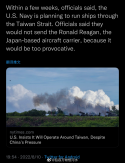Now that we're somewhat after the actual event, I think it's a good time for a post-action reflection of the visit. I personally think the trajectory of events and escalation (and lack thereof), was all relatively predictable.
IMO there were a few fundamental premises that people disagree on which makes China's seeming relative "inaction" seem confusing and/or frustrating.
My belief (since the beginning of this episode, and IMO which has been subsequently borne out with events), is that the PRC and PLA were never willing to use lethal force to interdict or intercept Pelosi's plane.
To elaborate -- the use of lethal force would have entailed and required a willingness to escalate and respond to US counters, with the understanding that there is a likely highway to direct military confrontation and war.
In short, the Chinese government did not clear the PLA to use lethal force in anger, because the Chinese government did not want to go to war over this issue at this time.
Once this is established, all of the complaints and frustrations become easily explained, as follows.
- If the PLA were not cleared to use lethal force in anger against Pelosi's plane, then aiming to intercept it in close quarters would only end up being perceived as an honour guard and end up giving Pelosi's side more ammunition as having "defied" the PLA and the PRC.
- For those people who are suggesting that if the PRC did not plan on stopping Pelosi, then they shouldn't have used the language that they did, let's hypothetically pretend that China did not use strong language to warn against Pelosi's visit. The issue still arises that the PLA still would not have been cleared to use lethal force to interdict the plane. Putting it another way, regardless of how much the PRC vocalized its warnings, the plane would have landed anyway. The difference is that if China didn't express harsh warnings, it would have signaled publicly that the Chinese government was consenting to this sort of action, and would almost certainly result in emboldening of the US and other parties to continue these actions in the future. If China didn't express harsh warnings, it would also result in a lack of clear causative linking between China's warnings and the subsequent military signaling and displays that everyone has to accept that China had clearly stated as something that they would not tolerate without a response.
- For those concerned that this will embolden other individuals and parties in future to carry out similar actions -- the answer is "yes, get used to it". In short, since 2016 the pattern of behaviour has been one where China's stance on Taiwan will be provoked more and more often and more frequently and salami sliced closer and closer to China's red line. The only true way of stopping this sort of salami slicing is the willingness to use lethal force in anger -- thus by extension, the only true way of stopping this sort of salami slicing is the willingness to go to war.
So, based on the above, there are really just two important questions that every PLA watcher needs to ask themselves:
1. Would China prefer to go to war at the present moment in time, or prefer to delay it in future?
-This specifically is a question one asks to ascertain how the evolving trajectory of balance of military and geopolitical power may change with time. Naturally, if one believes that a balance of power will be better in 5, 10 or 15 years into the future, then it would be desirable to delay conflict and avoid being provoked into suboptimal timing of military action. But, China of course still has a red line and does not have infinite patience, thus leading to the second question...
2. What exactly is China's red line that, if crossed, will cause China to be willing to go to war regardless of timing?
-This means, what is an action, change, or provocation occurs that would cause China to be willing to go to war even if it means giving up on a future period of time where it can go to war and achieve better outcomes and/or with lesser losses?
I believe if you have an answer to both of those two questions, then you are basically able to track and characterize the major decisions and planning that China and the PLA would be willing to do, to a certain level of generalizable detail.
A few days after the event, my view has not changed -- IMO, China and the PLA are willing to take all actions short of the use of lethal force (aka short of a willingness to go to war) to respond and react to this.
And the current exercises I think are a reasonable initial course of "all actions short of the use of lethal force" that is the least bad option at their disposal.
The US is likely to escalate signaling as well (for obvious reasons), and the PLA will do so in return. Whether it leads to a persistent state of long term elevated tensions with one side eventually getting bored and choosing not to escalate their signaling further, or whether it leads to continued escalating signaling resulting in armed conflict (likely due to miscalculation) -- who's to say.
Finally, speaking as a normal member (and not as a moderator), I have to observe that some of the reactions throughout this episode was somewhat disappointing and below the standards of PLA watching and geopolitical commentary on this forum.
I personally believe that striving to hold cold, clinical views with minimal emotion and temperament, is vital during tense moments of great potential danger and consequence, and I think that is a challenge every person interested in military matters and geopolitics, have to square with themselves.

